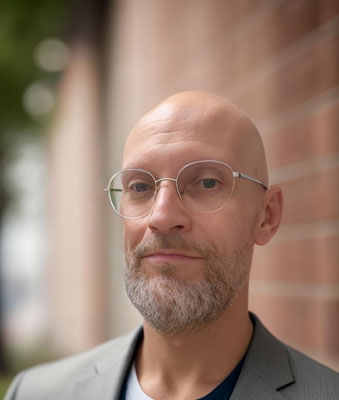reviews
What It Means to Be Protestant
The Case for an Always-Reforming Church
Gavin Ortlund
■ Zondervan, 2024, £16, 288pp
■ ISBN: 9780310156321
■ Reviewed by Ben Daniel, CMF Operations Director
I’ve witnessed a recent trend of Protestants wanting to be more grounded in their faith by delving deep into history, and then deciding to join the Catholic or Eastern Orthodox Church because they have found Protestantism too historically shallow and detached from the historic creeds. This desire for historic roots is a good one, and this book is here to show Protestants the richness and strength we have in two thousand years of history.
Ortlund looks at the core Protestant doctrines of salvation by faith alone as revealed in Scripture alone, showing how they’ve been present throughout the life of the church. He wades deep into history, convincingly displaying the unsteady grounding for ideas such as the papacy, icon veneration, and the bodily assumption of Mary.
The book is written in a wonderfully gracious way. He’s not disparaging of other traditions. Rather, he gently leads and encourages people back to Jesus. While we all have our theological blind spots, let us trust in the Lord and lean on him as we explore history.
The challenge for Protestants is to address our broad ‘historical shallowness, as well as the general lack of sacramental, liturgical, and aesthetic richness’. We can do this by humbly listening to and learning from other traditions. We’re also challenged to think beyond the 1500s. The Reformation didn’t create the true church but sought to put a stop to wayward practices, along with preserving and returning to mainstream practices from the Apostles. Ortlund shows these early practices by exploring writings from the Church Fathers and theologians from the Middle Ages; their commitment to the authority of the Bible and their focus on salvation by faith is quite evident. Salvation by faith is a hard doctrine, because I really want to do something to earn my salvation! But it is a glorious and precious doctrine. Protestants are necessarily always reforming and always seeking to correct theological errors because we know how prone our hearts are to creating little idols to follow.
While there are indeed true Christians within all traditions and expressions of our faith, the best expression of Christianity is in Protestantism. He says, ‘Protestantism is the most catholic and most biblical of all the major streams of Christianity’. This is because of its simplicity and relentless focus on the sufficiency of Christ.
It’s an easily accessible book, written for a popular audience. If you want to explore the historical grounding for Protestantism, then this is a great book for you!
The Road to Wisdom
On Truth, Science, Faith, and Trust
Francis S Collins
■ Little Brown and Company, 2024, £19.99, 288pp
■ ISBN: 1399822330
■ Reviewed by Steve Fouch, CMF Head of Communications
Renowned as the former head of the Human Genome Project, Collins is also an evangelical Christian and apologist for the interrelationship of science and Christian faith. He is already well known for his book, The Language of God, in which he argued that biology, among other sciences, points us towards a creator God.
His mission in this, his latest book, is to tackle head-on the culture of fear and suspicion of science among many Christians (especially, though not exclusively in the USA) and to humbly accept the things that he and his team got wrong in his time at the US National Institutes of Health (NIH), especially during the COVID-19 pandemic. He is keen to build a bridge between science and faith, giving his own testimony of coming to Christ, giving once again an apologetic of how science and faith are not necessarily in conflict, and seeking to appeal to the better angels of our nature.
He has a big, uphill struggle, and I enjoyed this highly readable, honest, and engaging book. I found his arguments strong – I am totally on board with where he is coming from. However, those suspicious and anxious about science (and often with good reason, as he humbly acknowledges) may need something more than this volume. But, as the ringing endorsements of secular and Christian leaders on the dust jacket attest, he is doing some important work here. Let’s pray he can continue to be a strong advocate for the importance of Christian faith in the world of science and of science in the world of faith.
The Immortal Life of Henrietta Lacks
Rebecca Skloot
■ Pan, 2011, £6.52, 431pp
■ ISBN: 9780330533447
■ Review by C Ruth Butlin, an ex-missionary and retired GP
This story is both appalling and enthralling. Much of what is described in Skloot’s book is ‘old news’ – it happened up to 70 years ago – but we can and must learn from things which went wrong in the past. Rebecca Skloot sets out to describe not only what happened to Henrietta Lacks, a poor, Black potato farmer whose cancer cells were taken and used without her consent or knowledge in medical research. It is also about what happened to the cells derived from her body, which took on a life of their own in cell cultures that are still used in countless laboratories around the world. Those ‘HeLa cells’ have been invaluable to scientists, but does the good they have achieved outweigh the way they were obtained?
It is important to note that the harvesting of Lacks’ cells was within normal professional practice and the law at the time. Over the ensuing 70 years, legislation now ensures properly informed consent for the collection and subsequent use of such tissue samples.
The story anticipates intellectual property rights and the feasibility of patenting human tissues, the use of human-derived products for experiments on living subjects, and the rights to privacy of relatives of deceased ‘tissue donors’.
Undoubtedly, the first commercial use of HeLa cell cultures for the production of the Salk vaccine to prevent polio led to great public good. Subsequent usage was in widely diverse and sometimes highly questionable experiments. In 1956, Chester Southam injected HeLa cells into prisoners in Ohio State Penitentiary to see whether cancers would develop in recipients. In 1963, he proposed the injection of HeLa cells into patients at a Jewish Hospital in Brooklyn, with the approval of the Director.
Had Henrietta’s identity not been publicly revealed, it is possible her sons and daughters would not have suffered as they did from harassment by investigating journalists (some of whom suggested that the family was owed money for the use of the cells) nor from the psychological distress of knowing something from their mother’s body was still in some way alive. There was no one amongst them with sufficient scientific education to easily understand what was being done with cell culture research. When they heard that HeLa cells had been ‘cloned’, apparently Henrietta’s daughter imagined there were multiple copies of her mother in existence. Most of the relatives adhered to a brand of Christianity strongly influenced by African Spiritualism. Some of them believed that Henrietta’s soul still lived in the progeny of cells from her body, so her soul would be suffering during experiments on the cell cultures.
This book challenged me to think about ‘ownership’ of our bodies and tissues derived from them, both during our lives and after death.
Evangelicals and Abortion:
Historical, Theological, Practical Perspectives
J Cameron Fraser
■ Wipf and Stock, 2024, £15.99, 220pp
■ ISBN: 9781666784510
■ Reviewed by Mark Houghton, author and retired GP
Abortion is the Cinderella subject of books, despite one-third of men and women using it. Perhaps we have got used to killing humans on a grand scale.
The author, J Cameron Fraser, is a Canadian evangelical pastor with wide experience. He brings a depth of evidenced research and a commitment to Jesus. He is aware of the grief and loss, confusion and pain of the women and men victims, buffeted by the pro-life/pro-choice conflict in society.
Fraser needs courage to write so pro-life. He traces the Bible’s love and compassion with a thorough review of Christian thinking through history. And how twentieth-century giants like John Stott, Francis Schaeffer, and the US Surgeon General, C Everett Koop, converged to give the embryo full human status from conception.
Yet sadly, he says little about the damage done to women and men, which is now so evident. And sadly, I found nothing on the biblical warnings against human bloodshed (eg. 2 Kings 17:17-20 and Luke 11:50-51). But happily, he concludes that revival and the power of Christ to transform society is our best hope.
Bonhoeffer
Pastor, Spy, Assassin
Directed and written by Todd Komarnicki
■ Angel Studios, 2024
■ Reviewed by Steve Fouch, CMF Head of Communications
Dietrich Bonhoeffer was something of a giant in twentieth-century Protestant theology. A brilliant student, he had a formative time in the US (particularly with his experiences in the Abyssinian Baptist Church in New York and seeing the racism experienced by its congregation) and later returned to Germany during the rise of Hitler. He opposed the collaboration with and capitulation to Nazism by the German Lutheran Church, helping to form an independent ‘Confessing Church’, training pastors outside the official seminary system. He was also actively involved in helping Jews escape to Switzerland as the Shoa/Holocaust began.
But eventually, Bonhoeffer was arrested and hanged for conspiracy to murder Hitler just days before the end of the war. Knowing the story (though far from being a Bonhoeffer expert), I found this film an engaging and well-acted, if somewhat glossed, version of his story. Jonas Dassler as Bonhoeffer was particularly good. The film managed to shoehorn in all his famous (and some alleged!) quotes, often out of their original context. There are many gaps and historical inaccuracies (some for dramatic reasons, while others, such as his engagement to Maria von Wedemeyer Weller, are mysteriously omitted). It also courts controversy for showing Bonhoeffer actively involved in the plan to assassinate Hitler – something that has never been proven.
However, where the film succeeds is in showing how important, hard, and dangerous it is for Christians to remain faithful to Christ when the surrounding culture goes in the opposite direction. It also shows the dangers when the church compromises with secular power. These are timely issues that the church in the East and West must face with governments of both the left and right.
This is not the first attempt to film his life (a made-for-TV film was released in 2000), but it has proven to be one of the more controversial depictions of Bonhoeffer. The film is a good introduction, but read a good biography (not the one by Eric Metaxas!) and his own works, especially Discipleship and Ethics, too.



